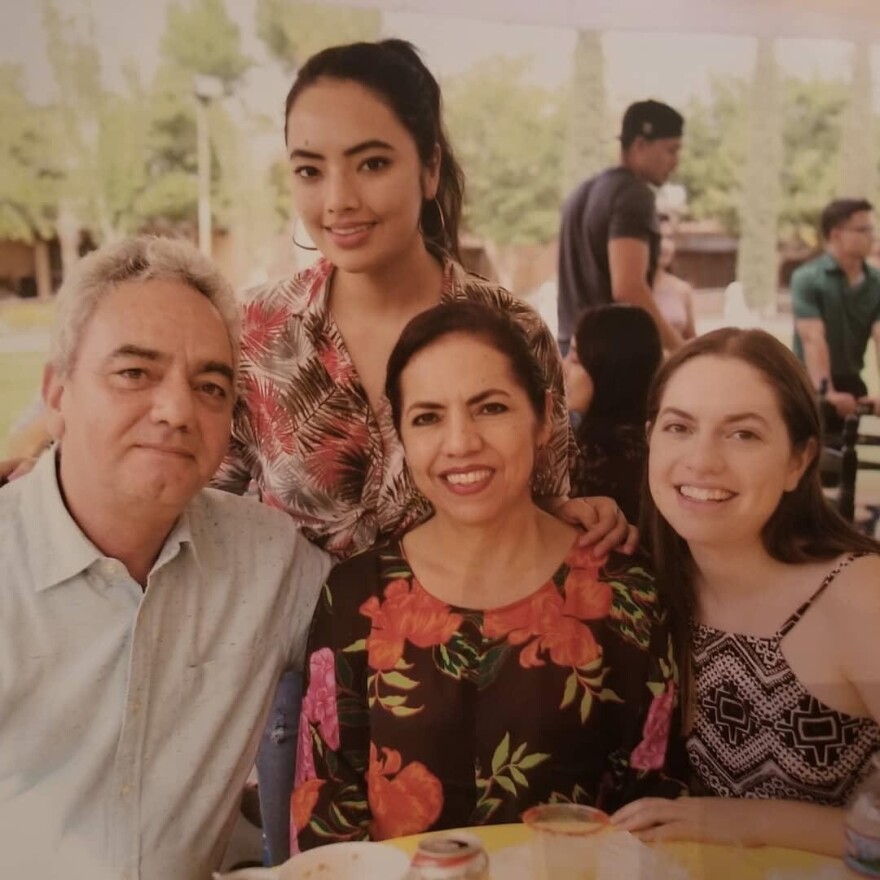All along the Texas-Mexico border voters with strong ties on both sides are casting ballots. They’re U.S. citizens whose jobs and families intersect with Mexico, and their political concerns span the border.
Ana Hernandez grew up on the border in the sister cities of El Paso and Ciudad Juarez.
“I like going over there, it’s home,” she said of Juarez where she was born and went to school. “But this is home too,” she said of El Paso, the city where she is building her career.
She talked about her binational life over lunch at a French style café on El Paso’s sprawling far east side. Hernandez, 27, is a marketing manager for a home builder.
“They’re like booming right here because that’s where there’s space to build new homes,” she explained.
After she moved to El Paso full time, she kept one foot in Juarez.
“I would still go back and forth to see my parents, all my friends, all my high school friends were over there,” Hernandez said.
That binational life is common along the Texas-Mexico border where tens of thousands of people have spent generations crisscrossing international bridges. They visit family and friends, attend school, work and do business. There are social gatherings, shared holiday and cultural connections. Many are dual citizens. That experience shapes their political views. International issue local for those who live on the border.
Among their concerns, the shutdown in March of the border to all but essential travel as a COVID-19 precaution, strengthening U.S.-Mexico relations and cooperation and the recent rise of anti-Mexican rhetoric. That doesn’t reflect the reality of the Texas border economy and businesses that depend on trade and customers from Mexico.
“A lot of our businesses here boom because of all the people who come in. Just hating on people for where they come from is stupid. We’re all building this community together,” she said.
Hernandez, like many new voters, felt compelled to participate in the political process. After years as a U.S. legal resident, she became a citizen.
“Right after Trump won the election, I got it because I got scared and I was like what if he actually sends people back with green cards? I’m building my life here,” said Hernandez.
Since becoming a citizen, she’s voted in local and state elections, but this is the first time she casts a ballot for president. She took advantage of early voting this election season.
“It was really fast, very easy to vote,” said Hernandez right after casting a ballot. “I’m very excited. I’m hoping the results are what I expect them to be.”
Her younger sister shares that excitement. Claudia Hernandez, a 23-year-old University of Texas at El Paso student, is also voting in her first presidential election. She sees it as a civic duty.
“We are maybe speaking out for people, people like us, Mexican people or Latino people who don’t really vote or can’t vote,” said Claudia.
The sisters and their mother Ana Patricia Riviera Vasquez during a recent zoom interview from their home in El Paso talked about the policy issues that concern them.
“I’d like more focus on public health,” said Riviera Vasquez. These days Rivera Vasquez and her husband spend most of their time in Ciudad Juarez caring for the girls’ grandmother during the pandemic.
“They thought shutting down the border would solve the problem but no” said Rivera Vasquez. “The proof is that COVID-19 has greatly affected El Paso as well as Juarez.”
She said the border travel restrictions only created more economic hardship on both sides of the border.
She worries the U.S. government does not accept Mexico as a neighbor, a partner in solving problems and valuable economic contributor, especially in border cities like El Paso.
She’s proud of her daughters for forging a path in the U.S. without forgetting Mexico.
“We’re always going to need each other. El Paso needs Juarez. Juarez needs El Paso,” Ana Hernandez said. She’s now encouraging other Latino voters to get off the sidelines and seize this moment.
"We have a voice that counts. This voice can mean so much if we all raise it at the same time and this is the time to do it so we can see a change in the future,” said Hernandez.
Copyright 2020 KTEP. To see more, visit their website here.

